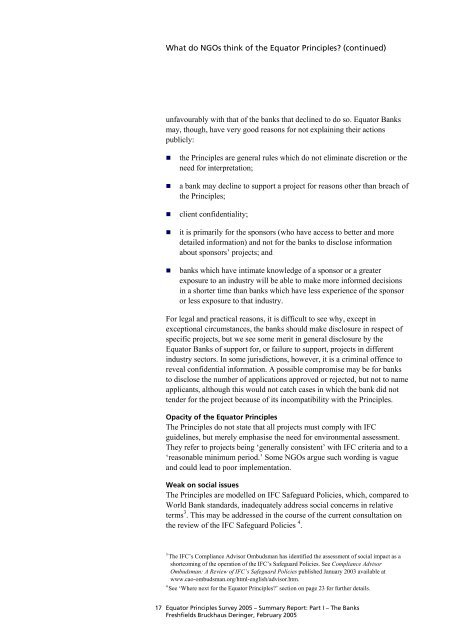Who and where are the Equator Banks? - IILJ
Who and where are the Equator Banks? - IILJ
Who and where are the Equator Banks? - IILJ
Create successful ePaper yourself
Turn your PDF publications into a flip-book with our unique Google optimized e-Paper software.
=<br />
tÜ~í=Çç=kdlë=íÜáåâ=çÑ=íÜÉ=bèì~íçê=mêáåÅáéäÉë\=EÅçåíáåìÉÇF<br />
unfavourably with that of <strong>the</strong> banks that declined to do so. <strong>Equator</strong> <strong>Banks</strong><br />
may, though, have very good reasons for not explaining <strong>the</strong>ir actions<br />
publicly:<br />
• <strong>the</strong> Principles <strong>are</strong> general rules which do not eliminate discretion or <strong>the</strong><br />
need for interpretation;<br />
• a bank may decline to support a project for reasons o<strong>the</strong>r than breach of<br />
<strong>the</strong> Principles;<br />
• client confidentiality;<br />
• it is primarily for <strong>the</strong> sponsors (who have access to better <strong>and</strong> more<br />
detailed information) <strong>and</strong> not for <strong>the</strong> banks to disclose information<br />
about sponsors’ projects; <strong>and</strong><br />
• banks which have intimate knowledge of a sponsor or a greater<br />
exposure to an industry will be able to make more informed decisions<br />
in a shorter time than banks which have less experience of <strong>the</strong> sponsor<br />
or less exposure to that industry.<br />
For legal <strong>and</strong> practical reasons, it is difficult to see why, except in<br />
exceptional circumstances, <strong>the</strong> banks should make disclosure in respect of<br />
specific projects, but we see some merit in general disclosure by <strong>the</strong><br />
<strong>Equator</strong> <strong>Banks</strong> of support for, or failure to support, projects in different<br />
industry sectors. In some jurisdictions, however, it is a criminal offence to<br />
reveal confidential information. A possible compromise may be for banks<br />
to disclose <strong>the</strong> number of applications approved or rejected, but not to name<br />
applicants, although this would not catch cases in which <strong>the</strong> bank did not<br />
tender for <strong>the</strong> project because of its incompatibility with <strong>the</strong> Principles.<br />
lé~Åáíó=çÑ=íÜÉ=bèì~íçê=mêáåÅáéäÉë=<br />
The Principles do not state that all projects must comply with IFC<br />
guidelines, but merely emphasise <strong>the</strong> need for environmental assessment.<br />
They refer to projects being ‘generally consistent’ with IFC criteria <strong>and</strong> to a<br />
‘reasonable minimum period.’ Some NGOs argue such wording is vague<br />
<strong>and</strong> could lead to poor implementation.<br />
tÉ~â=çå=ëçÅá~ä=áëëìÉë=<br />
The Principles <strong>are</strong> modelled on IFC Safeguard Policies, which, comp<strong>are</strong>d to<br />
World Bank st<strong>and</strong>ards, inadequately address social concerns in relative<br />
terms 3 . This may be addressed in <strong>the</strong> course of <strong>the</strong> current consultation on<br />
<strong>the</strong> review of <strong>the</strong> IFC Safeguard Policies 4 .<br />
3 The IFC’s Compliance Advisor Ombudsman has identified <strong>the</strong> assessment of social impact as a<br />
shortcoming of <strong>the</strong> operation of <strong>the</strong> IFC’s Safeguard Policies. See Compliance Advisor<br />
Ombudsman: A Review of IFC’s Safeguard Policies published January 2003 available at<br />
www.cao-ombudsman.org/html-english/advisor.htm.<br />
4 See ‘Where next for <strong>the</strong> <strong>Equator</strong> Principles?’ section on page 23 for fur<strong>the</strong>r details.<br />
NT= bèì~íçê=mêáåÅáéäÉë=pìêîÉó=OMMR=Ó=pìãã~êó=oÉéçêíW=m~êí=f=Ó=qÜÉ=_~åâë=<br />
cêÉëÜÑáÉäÇë=_êìÅâÜ~ìë=aÉêáåÖÉêI=cÉÄêì~êó=OMMR=

















